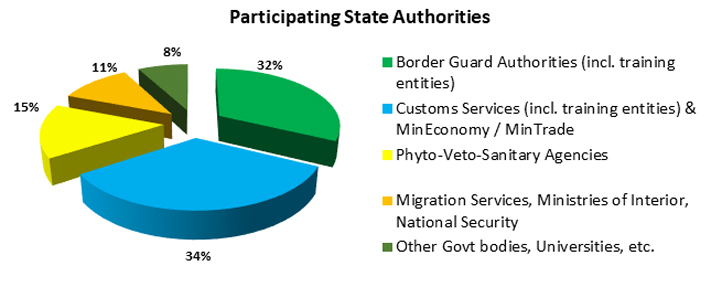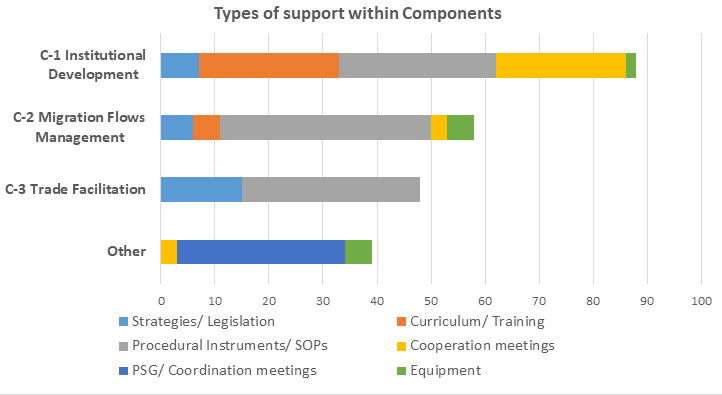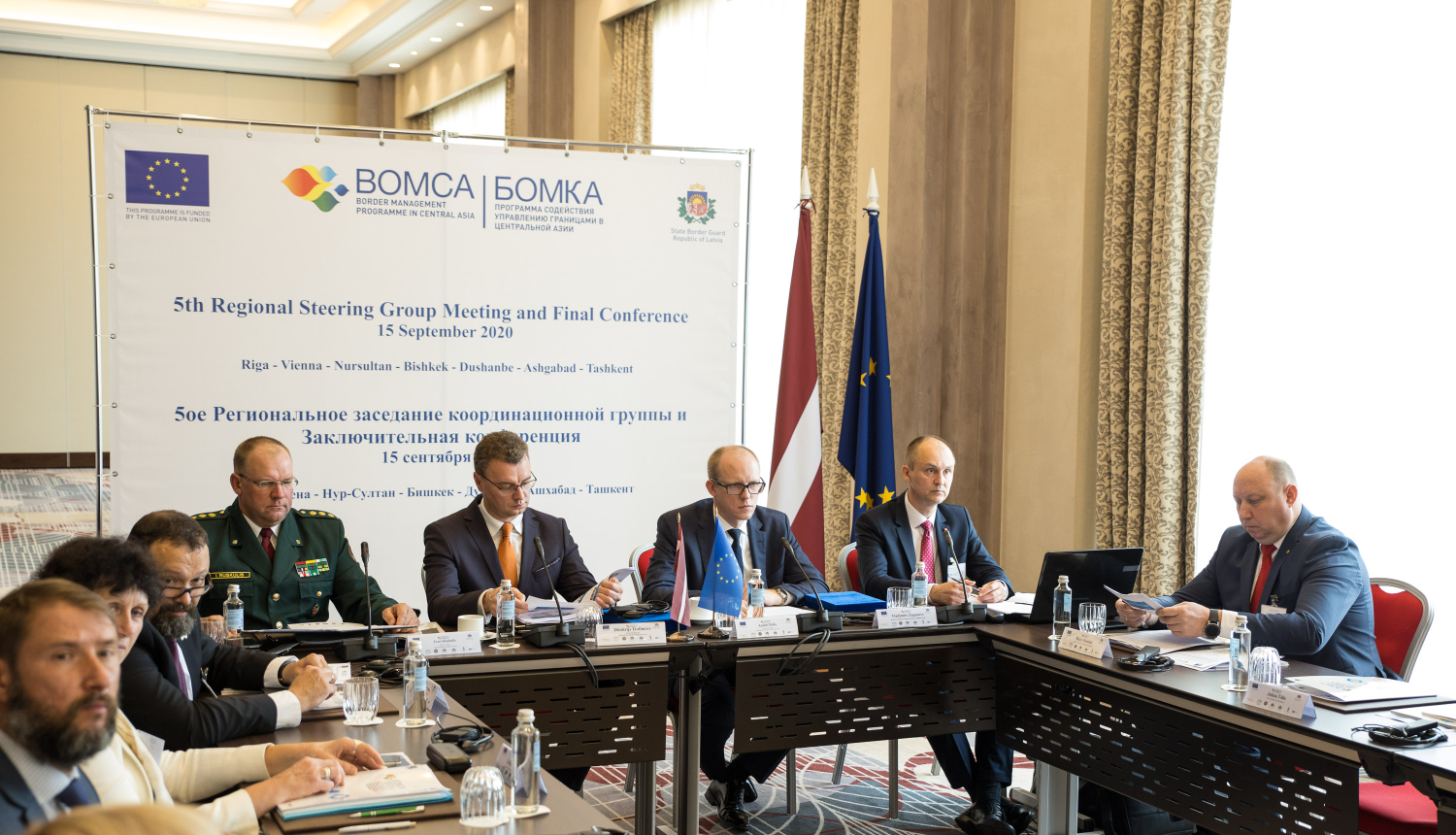The European Union-funded Border Management Programme in Central Asia (BOMCA) announces the completion of its Phase 9, which covered the five-year thematic work in support of the institutional development of border management agencies, management of mixed migration flows, and facilitation of trade regimes at the borders of Central Asia (CA).
The effectiveness of border management is a key component of the security and stable economic development of our region. We highly appreciate the support of the European Union to the countries of the region in the field of state border management and express gratitude to our European partners - the State Border Guard of Latvia, Riga Technical University, the Customs Department of the Ministry of Finance of Lithuania, the International Centre for Migration Policy Development, as well as associated partners from Portugal (Immigration and Border Guard Service) and Hungary (Ministry of Internal Affairs) for the effective implementation of the 9th phase of the Program” - Mr. Rustem Zhappasov, Ministry of Foreign Affairs of the Republic of Kazakhstan.
The 9th phase of the BOMCA Programme spanned over 2015-2020 with a total budget of 6.6 million Euro and targeted to strengthen capacities of the Central Asian border management institutions: border guards, customs, migration authorities, food veterinary and phytosanitary services, as well as the respective higher education and training entities.


The progress reached with BOMCA’s Phase 9 has covered a comprehensive set of measures based on the conceptual framework of Integrated Border Management. To that end, 223 individual activities were delivered with the engagement of more than 3 200 state officials from the Central Asian beneficiary agencies. The efforts were implemented through soft adaptation measures, such as capacity-building and awareness-raising (professional knowledge, functional skills and specific practices), regulatory frameworks (legal, strategic, technical, procedural, organisational, methodological and others), cooperation and information exchange at different levels (intra-service, inter-agency and international). Sharing of know-how and best practices both from the EU MS and between the CA countries was among the fundamental principles of the project. In addition to this, the countries of the region were assisted with the surveillance and control type equipment for the border checkpoints and modern technologies for the training entities worth over 500 000 EUR in total.

During the BOMCA-9 Final Conference, the participating state agencies presented many encouraging examples on the utilization of the project-produced outcomes and actions initiated on various other recommendations related to the furtherance of the border management capacities.
"The recommendations of the Baltic colleagues were used in practice by the Border Service for improving the identification and profiling mechanisms, the exchange of operational information, inter-agency coordination of the state border regime issues, conducting of risk analysis and operational work. With the practical and methodological assistance of the Riga Technical University, the Al-Farabi Kazakh National University became the first higher educational institution in Central Asia to receive WCO accreditation for the "Customs Affairs" training program.” – the Republic of Kazakhstan.
"It can be noted with confidence that the implemented activities of the EU-BOMCA Program have strengthened the analytical potential and professional capacities of the competent authorities, contributed to the development of the infrastructure of the border guard and customs services, and the improvement of the existing national legislation. Tangible results have been achieved in strengthening regional cooperation.” – the Kyrgyz Republic.
"Tajikistan remains at the frontline of the barrier to entry and spread of international terroristic activities, transnational crime, criminal groups, drug trafficking, and many other challenges, which pose a threat not only to the Central Asian region but also to the entire world. The material, technical and educational results of BOMCA 9 assistance to Tajikistan are particularly noteworthy in this context.” – the Republic of Tajikistan.
"Our cooperation with the BOMCA 9 Program has been very fruitful. Much has been achieved over the years of cooperation; a whole range of activities was carried out to develop integrated border management, in which hundreds of employees of the customs service of Turkmenistan took part. The conducted trainings were useful in raising the level of practical skills of customs officers in such areas as prevention and detection of cases of illegal circulation of goods, the use of the risk management system and many others.” – Turkmenistan
“The implemented activities of the EU BOMCA-9 Program in Uzbekistan are considered effective from a practical point of view and in terms of acquiring additional knowledge in the field of border and customs controls, training of service dogs, as well as in the field of veterinary and phytosanitary services. The e-learning programs are introduced; selective inspection of vehicles and goods is organized at individual checkpoints; the API system is used at the airport checkpoints; customs risk management system is further improved; trainings on professional behaviour and anti-corruption are multiplied in the border management agencies.” – the Republic of Uzbekistan.
The BOMCA 9 Implementing Consortium of EU Partners would like to acknowledge and sincerely thank the national partners in the Central Asian countries for the joint work and productive cooperation throughout the project implementation at both the national and regional levels. This collective approach integrated the efforts to address the border security challenges in the region, as well as fostered changes for more efficient institutional regulation, more robust border controls, better risks management mechanisms, streamlined procedures and practices, scaled-up networks and interaction.
“The successful completion of this phase proves again the continued spirit of cooperation and commitment to ensuring a common goal for effective border management and, in so doing, achieving the security and stability along the borders of Central Asia and Europe. The State Border Guard of Latvia will continue playing a Project Leader role in the new Consortium for implementing the 10th Phase of the Programme and I look forward to pursuing our cooperation and joint work.” – General Guntis Pujats, Chief of the State Border Guard of Latvia.



